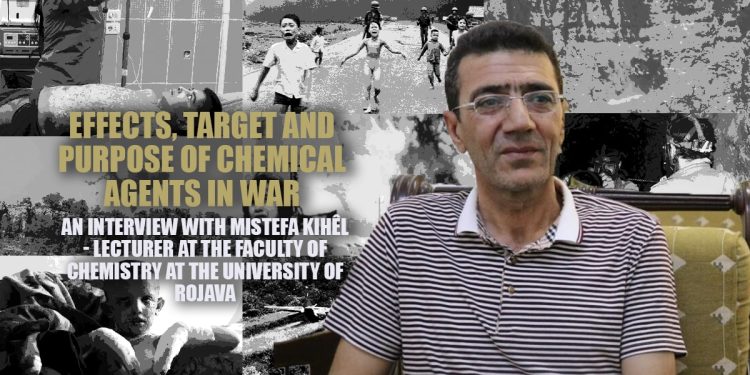NEWS CENTER – In an interview with ANHA news agency, Mistefal Kihêl, a lecturer of the Faculty of Chemistry from the University of Rojava spoke about the use of chemical weapons and the impact of this in relation to the massive use of banned weapons by the Turkish occupying state against the Medya Defense Areas.
Thus, the People’s Defense Forces announced that in the last 6 months, the Turkish occupying state used chemical weapons and poison gas 323 times against the Freedom Kurdistan guerrillas in the Medya defense areas in southern Kurdistan. Moreover, in the last monthly balance sheet published by HPG, it was announced that the occupation soldiers of the fascist AKP-MHP regime used chemical weapons 164 times in the last month alone (after another invasion operation was launched against the Medya defense areas by the Turkish occupation state).
Lecturer Kihêl noted that these weapons are used specifically to inflict massacres and genocide.
HARMFUL EFFECTS OF CHEMICAL WEAPONS LAST FOR YEARS
Kihêl pointed out that chemical weapons have their effects on the region and population where they are used for years, referring to Vietnam and Halabja, which have been victims of chemical weapons use in the past. He said, “Thousands of people have lost their lives and their impact on nature remains to this day. Even recently born children show deformities and are under the influence.”
“Most of the gases currently used are mustard gases, cold and white phosphorus and nitrogen. The Turkish army uses these gases but does not disclose them and keeps them as government secrets. States use these gases for their own interests,” he continued.
“BURNING HUMAN BODY”
“When chemical gas comes into contact with the human body, cancer begins to spread to every part of the body. It affects the heart, the lungs, the nervous system and even the eyes. Chemical weapons bring forth a new generation that is not normal. It also harms and changes nature,” the lecturer said.
Kihêl explained that white phosphorus, when it reacts with oxygen, burns the human body and even melts the lungs. He cited the burns on the body of a boy named Mihemed in Rojava where this gas was used.
The Turkish occupation army used chemical weapons in its attacks on Serêkaniyê in 2019. Effects of chemical weapons were observed on the body of a boy named Mihemed Mihemed, which attracted worldwide media attention.
Kihêl spoke about the effects of chemical weapons on nature and the environment, saying, “Their effects last for decades. Fruit trees cannot provide their normal produce. Chemicals even attack rocks in seas and rivers.”
“Chemical weapons not only damage the area where they are used, but also the surrounding environment. When they penetrate surrounding plants, they affect the entire environment,” he added.
CRIMES AGAINST HUMANITY
Kihêl noted that the use of chemical weapons is banned worldwide because of the above-mentioned consequences. “But unfortunately, the interests of states and their relations with each other pave the way for the use of these weapons. The Turkish state used chemical weapons against Armenians in the past. A few years ago, the international community condemned the Turkish state.”
Kihêl said that the Turkish state has repeatedly burned numerous villages throughout history, as can be seen in the Aliya region of Girkê Legê. “When these villages were burned down, Turkey targeted not only people but also nature.”
APPEAL TO JOURNALISTS, INTELLECTUALS AND EXPERTS
Kihêl stressed that Turkey’s use of chemical weapons against HPG and YJA-Star guerrillas is a crime against humanity. “Our journalists, intellectuals and experts must disclose the documents on the use of chemical weapons,” he concluded.




